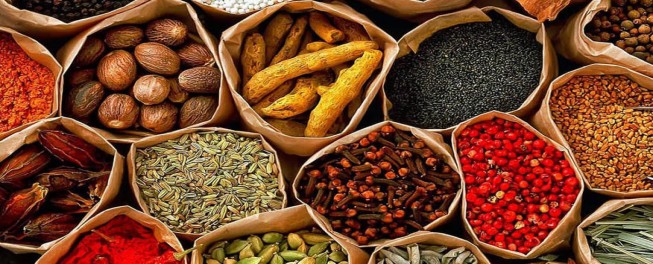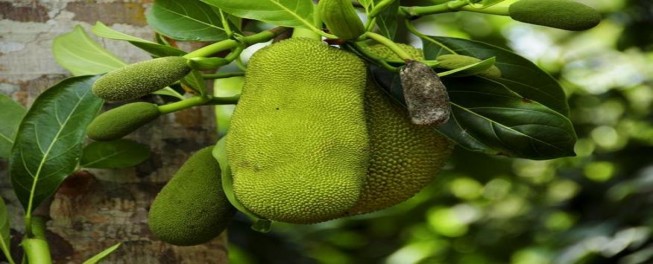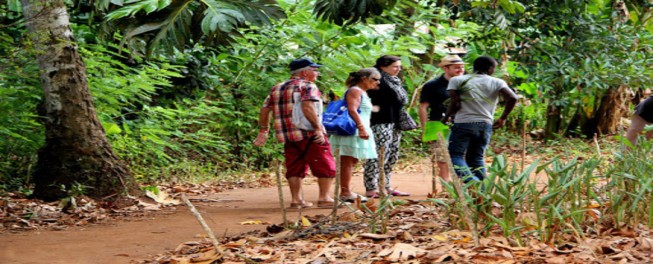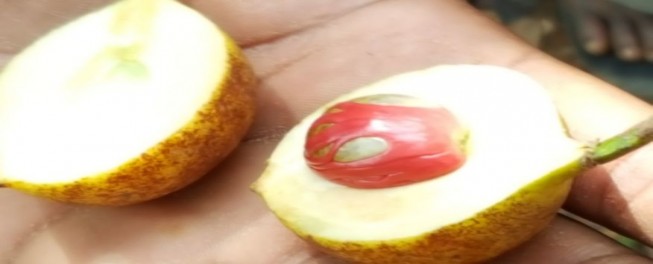zanzibar tours excursions
Spice Plantation Tour
Experience the Exotic Aroma of Zanzibar: Embark on a Captivating Spice Farm Tour!
0 Day $ 20 pp
Exploring the Spice Tour in Zanzibar: A Journey Through Flavor and Culture
One of the top attractions on the island, the Spice Tour in Zanzibar offers an immersive experience into the island's rich aromatic heritage. Often referred to as the "Spice Island," Zanzibar has a storied history in the spice trade that dates back centuries. Taking a Spice Tour allows visitors to delve into the origins, uses, and cultural significance of various spices, making it a must-do activity. This guide explores the essence of the Spice Tour in Zanzibar, emphasizing its historical background, the spices featured, the tour experience, and its impact on local communities.
Historical Significance of Zanzibar's Spice Trade
Zanzibar has been a crucial center for spice trade since the 19th century, thanks to its ideal climate and fertile land. Cloves, nutmeg, cinnamon, and black pepper are just a few of the spices cultivated on the island. European powers, particularly the Portuguese and Omani Arabs, recognized Zanzibar's potential, establishing plantations and trade routes that greatly influenced the island's economy and culture.
As a result, Zanzibar became a cultural crossroads, with traders from Africa, Persia, India, and Europe mingling on its shores. The spice trade not only bolstered the local economy but also enriched the culinary landscape of the region. Today, visitors can witness the remnants of this vibrant history in Stone Town, a UNESCO World Heritage Site, where diverse cultural influences are visible in its architecture, markets, and street life.
Understanding this historical backdrop enhances the Spice Tour experience, enabling visitors to appreciate the deep-rooted connections between Zanzibar's past and its contemporary spice culture.
Discovering Zanzibar's Spices
A Spice Tour in Zanzibar is a sensory adventure through a myriad of spices that have shaped both local and international cuisine. The island is especially known for its cloves, introduced in the 19th century, which have become a significant export. On the tour, guests learn about the clove tree's cultivation process, from planting to harvesting, as well as its various culinary and medicinal applications.
The tour also highlights nutmeg and mace, both integral to Zanzibar’s spice offerings. Nutmeg is used to enhance both sweet and savory dishes, while mace adds a distinct flavor to various recipes. Tour guides often share engaging stories about the historical significance of these spices, including how they were once treated as currency in trade networks.
Cinnamon is another star of the Spice Tour, known for its warm flavor and historical uses in food and medicine. Participants can observe the harvesting and processing of cinnamon bark into spice sticks or powdered form. Other interesting spices featured on the tour include black pepper, vanilla, turmeric, and cardamom, each with its own fascinating tale.
The Spice Tour Experience
The Spice Tour typically begins with a guided walk through the lush plantations where spices thrive in their natural environments. Knowledgeable guides offer insights into each spice's cultivation and historical relevance while engaging visitors with interactive demonstrations. Attendees often have the chance to taste fresh spices directly from the plants, enhancing their appreciation for the flavors and aromas.
In addition to touring the plantations, many Spice Tours include visits to local markets where spices are sold alongside traditional handicrafts. This part of the tour allows tourists to interact with local vendors and gain a deeper understanding of Zanzibar's vibrant marketplace culture.
Some tours also feature elements of local culture, such as traditional music and dance performances, showcasing how spices have influenced local customs and celebrations. The combination of sensory experiences—the rich aromas of spices, stunning visuals of plantations, and vibrant sounds of local music—creates an unforgettable adventure that lingers in the memory long after the tour ends.
Supporting Local Communities Through Spice Tours
The Spice Tour serves a dual purpose: providing an educational experience for visitors while supporting local communities. Many tour operators collaborate with local farmers to ensure they benefit from tourism, promoting sustainable practices that foster environmental conservation and create economic opportunities for residents.
By participating in a Spice Tour in Zanzibar, visitors not only gain insight into the island's spice culture but also contribute to preserving traditional farming methods that have been cherished for generations. This engagement helps to sustain the local economy and enrich the cultural tapestry of Zanzibar, making the Spice Tour an enriching experience for all.
frequently asked questions
Q: What can I expect to see and do during the Spice Tour in Zanzibar?
A: During the Spice Tour, you will explore various spice plantations, learn about the cultivation and harvesting processes, and experience the aromatic scents of spices like cloves, nutmeg, cinnamon, and vanilla. The tour often includes demonstrations on how spices are used in local cuisine and traditional medicine, as well as opportunities to sample fresh spices.
Q: How long does the Spice Tour typically last?
A: The Spice Tour usually lasts about 2 to 3 hours, depending on the specific itinerary and any additional activities included, such as cooking demonstrations or tasting sessions.
Q: Is the Spice Tour suitable for all ages?
A: Yes, the Spice Tour is suitable for all ages. It offers an engaging and educational experience for children and adults alike, making it a great family activity. However, parents should supervise younger children during the tour.
Q: Are there any health concerns or restrictions I should be aware of before participating in the Spice Tour?
A: The Spice Tour is generally safe for most participants. However, individuals with specific allergies, particularly to spices or plants, should consult with a healthcare professional before attending. Additionally, it's advisable to wear comfortable clothing and shoes, as the tour may involve walking on uneven terrain.
Q: How can I contact customer support if I have further questions or need assistance?
A: You can reach our customer support team via email at info@babusafaris.com or by calling our hotline at +255 777 043 720. Our team is available to assist you with any inquiries or concerns you may have regarding the Spice Tour.
Discover Exciting Things to Do at Spice Tour: Maganga Spice Farm
Located on the lush and vibrant island of Zanzibar, the Maganga Spice Farm invites you to explore an immersive experience in the world of spices. Historically significant in trade routes and culinary practices, this spice tour highlights the rich agricultural heritage of Zanzibar. You'll have the unique opportunity to engage with local farmers, learn about sustainable farming practices, and appreciate the intricate flavors that spices bring to various cuisines. As you embark on this sensory journey, you'll uncover the importance of spices both historically and in contemporary life, making the Maganga Spice Farm a must-visit destination for anyone keen to explore the cultural tapestry of Zanzibar.
Historical Significance of Spices
The history of spices is intricately linked to Zanzibar's identity as the "Spice Island." In the 19th century, Zanzibar was a crucial hub in the spice trade. The Maganga Spice Farm pays homage to this legacy by showcasing a variety of spices that were once highly sought after by traders from Europe, the Middle East, and Asia. Cloves, nutmeg, cinnamon, and black pepper are just a few spices that flourished here, contributing to Zanzibar's historical economic prosperity.
During the spice tour, visitors are guided through lush plantations where they witness the cultivation of these aromatic plants. Knowledgeable guides share fascinating stories about how spices have been used for culinary, medicinal, and preservative purposes. This historical context enriches your visit, allowing you to appreciate the significance of spices beyond their delightful flavors.
Interactive Learning Experience
One of the most engaging things to do at the spice tour is to enjoy its interactive nature. Guests are encouraged to touch, smell, and taste various spices, transforming the experience into a multi-sensory educational adventure. You can pluck fresh cardamom pods from their stems or grind cinnamon bark into powder, gaining an intimate understanding of the labor-intensive processes involved in spice production.
Guides also demonstrate traditional methods of harvesting and processing spices, offering insights into sustainable agricultural practices that have been passed down through generations. With a focus on sustainability, the Maganga Spice Farm promotes responsible tourism and encourages visitors to consider their impact on the environment.
Culinary Delights and Cultural Exchange
A highlight of the spice tour is the culinary demonstration featuring traditional Zanzibari dishes. This segment not only showcases the versatility of spices but also fosters a cultural exchange between visitors and local chefs. You may learn to prepare flavorful dishes such as biryani or pilau, which are rich in cultural significance.
This culinary experience serves as a bridge between cultures, illustrating how spices unite people through shared culinary experiences. Visitors often leave with recipes and a newfound appreciation for the art of cooking with spices, enriching their understanding of Zanzibari culture and encouraging them to incorporate these flavors into their own cooking back home.
Conservation and Community Impact
The Maganga Spice Farm is more than just a tourist attraction; it plays a vital role in the local community's economy. By supporting sustainable farming practices and promoting eco-tourism, the farm helps preserve Zanzibar's natural resources while providing livelihoods for local farmers. The tour emphasizes community involvement in conservation efforts, showcasing how responsible tourism positively impacts local economies.
Visitors are encouraged to purchase spices directly from the farm, ensuring that profits benefit local farmers rather than large corporations. This direct trade model fosters economic empowerment and sustains sustainable practices within the community. As you leave with bags of freshly harvested spices, you contribute to a cycle of support that helps maintain cultural heritage and environmental sustainability.
Exploring the Maganga Spice Farm on your spice tour offers an enriching experience that transcends mere sightseeing. It immerses you in the historical significance of Zanzibar's spice trade, provides interactive learning opportunities about sustainable agriculture, showcases culinary traditions, and emphasizes community impact through responsible tourism. Discover the myriad things to do at this spice tour and create lasting memories while deepening your understanding of Zanzibar’s unique cultural heritage.
Price Inclusion for the Spice Tour
- Guide Fee
- Entrance Fee
- All Government Taxes
Note: Hotel transfers are available at an additional cost.
This concise guide outlines the price inclusion for the spice tour, ensuring you have a clear understanding of what to expect.






